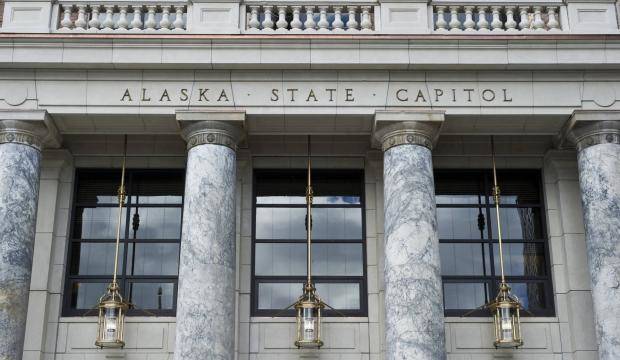This month’s Democratic Party primary was supposed to lay out a welcome mat for “independent thinkers.” That’s how Casey Steinau, the state chairperson, described the 2016 party rule change that allows Alaskans unaffiliated with a recognized party to compete with Democrats. But for Gov. Bill Walker, Rep. Dan Ortiz, I-Ketchikan and House candidate Chris Dimond, the best political calculus is establishing independence from Democrats.
Let’s start with Dimond. He’s running to replace Sam Kito III in District 33, which includes Gustavus, Skagway, Haines, Klukwan and Excursion Inlet, all heavily anchored to downtown Juneau and Douglas. It’s such a well-established Democrat stronghold that there isn’t even a Republican running for the seat this year.
By all practical measures, Dimond matches up well with traditional Democrats. He’s from the labor/trade class of workers that, until the 1990s, had been one of the party’s central constituencies. He’d been a union organizer since 2103. And on the fiscal side, he’s willing to consider an income tax to close the gap between state revenue and spending.
Strategically though, opting out of the primary gave Dimond a guaranteed spot on the general election ballot. There he’ll face only one Democrat instead of the three running for the party’s nomination. He can still appeal to centrist Democrats and independents. And it’s likely he’ll pick most of the registered Republicans who couldn’t vote for him in the primary.
It’s a very different story for Ortiz. The former Ketchikan school teacher was a registered Republican in a district which had been solidly Republican for years. He left them for the upstart Republican Moderate Party, became a Democrat for a short time, and finally walked away from them all.
In other words, Ortiz’s first loyalty was to principles rather than party. So in 2014 it made sense for him to run as an independent. That year he squeaked past the Republican candidate with just over 50 percent of the vote. In 2016, his reelection margin was 10 percent.
Unlike the last two elections though, this year the Democrats have a contender.
Ghert Abbott is a 32-year old political newcomer who entered the race just before the filing deadline. Until he declared his candidacy, there wasn’t any reason for Ortiz to run in the primary. A disadvantage he had to consider though was the possibility he’d alienate some of the less hardcore Republicans who helped elect him four years ago.
Like Abbott, former U.S. Sen. Mark Begich jumped in the race for governor on the last day. That changed Walker’s reelection strategy. A month earlier he had filed to run in the Democratic primary. Now he’s out.
Everyone knows Walker’s story. Philosophically he’s a Republican. He dropped his party affiliation when he and Democratic Party nominee Byron Mallot formed the non-partisan unity ticket late during the 2014 campaign. That Hail-Mary pass put him in the Governor’s mansion.
What makes Walker independent isn’t a label though. It’s his ability to govern without being tethered to the dictates of either party.
One can argue, as Kim Metcalfe did in her Empire piece 10 days ago, that Walker should have faced Begich in the primary. But on the other hand, Begich might not have run at all had he known Walker would change his mind. Because a three-way race is a much bigger hurdle for him too.
Begich had two distinct advantages running against Walker in the Democratic primary. First, the thousand of registered Republicans who supported Walker four years ago wouldn’t be eligible to vote. And he could expect the party bosses to favor him the same way the national party sided with Hillary Clinton when independent Sen. Bernie Sanders challenged her during the presidential primaries two years ago.
That brings me to my conclusion. The Democrats changed their primary rules to benefit them, not the people.
The right way to give voters the widest range of candidates to choose from is with nonpartisan blanket primaries like Louisiana, Washington and California. That’s when they’re all on one ballot regardless of party. And the top two vote getters advance to a showdown in the general election.
Anything less than that leaves Democrats and Republicans in control of the primaries. If that’s what they want, then they, not the state, should be paying the entire bill to hold them.
• Rich Moniak is a Juneau resident and retired civil engineer with more than 25 years of experience working in the public sector. He contributes a weekly “My Turn” to the Juneau Empire. My Turns and Letters to the Editor represent the view of the author, not the view of the Juneau Empire.

